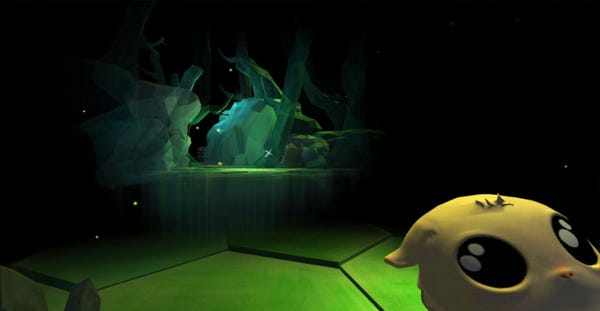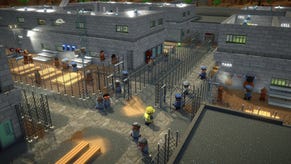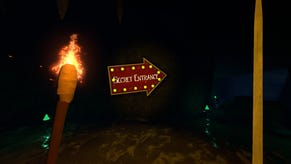Echomokation: Pulse Is About Blindness And Synesthesia
I don't think I've ever paid so much attention to stairs in a videogame.
Pulse's are the creakiest goddamn things, but that's kind of the point. You're blind, you see (see what I did there, etc), but you "see" via a synesthestic echolocation-like mixture of pre-blindness memories and sound. So a stair's high-pitched whimper sends a blade of "sight" reverberating through the black. It suddenly becomes visible beneath your feet, if only for a moment. Meanwhile, churning gears provide more consistent sources of vision, and you can strike things like gongs to significantly widen your field of view. Oh, and also there are Mokos. The little squealbags are the absolute most adorable things, which naturally means they must die for your cause. Oof, right? That's what you get for being blind. Seriously, though, Pulse is one of the more interesting things I've played in quite some time. Details and further impressions after the break.
Pulse has actually been around for a few months in the form of a fully playable student project, but now Team Pixel Pi's graduated and earned the right to develop Big Person Games. So naturally, where better to start than completely in the dark? Also, they've taken Pulse's full version to Kickstarter, asking for $75,000 to help expand the prototype into a larger commercial product.
But how does it actually work? Pretty darn well, for the most part. Sounds are deliciously creaky and crunchy - sometimes to the point of being overwhelming. All around you, they reverberate wispy ghosts of scenery, briefly giving you (sometimes false) positives on rocky ledges, hexagonal chunks of land, whirring fan blades, and the like. Rarely, however, is that frustrating. Instead, it adds to an overall feeling of helplessness, like the environment constantly has your cornered, and the lumbering beasties hiding in plain sight can pounce - feet clomping like war drums, drowning out your fragile character's ragged breaths - at any given moment. It's pretty terrifying, honestly.
Most of the puzzles, meanwhile, tow the line between plainly obvious (to the point of thinly veiled linearity) and just vague enough to force you out of whatever safe corner you've found to cower in. That said, I did encounter a couple that were a bit too unclear in sign-posting my objectives, which made things orders of magnitude more confusing when I was already, you know, blind. Also, I often found myself heavily reliant on Mokos, whose subpar AI sometimes left them lodged in places they didn't belong. The result? I had to backtrack, sometimes through entire puzzles, to reclaim them so they could be used to power gears or help flip a switch or something along those lines.
Pulse is still an insanely intriguing experience, though, and a largely successful one at that. I felt like my eyes were being choked, retching and gasping sight as I feebly fumbled to move forward. And yet, while a constant tension hung over my whole playthrough, I rarely had to press my face against walls in a struggle to find a single opening or anything like that. It's easy to underestimate excellent level design when you can't actually see any of it, but Team Pixel Pi's invisible hand guided me well. So yes, the prototype's a strong effort, and I highly recommend giving it a go if you haven't already.
Assuming the Kickstarter's successful (as of writing, it was at a hair over $3,000 with 35 days left on the clock), the full game's due in November of 2014. Do you find it worthy of your colored monetary cloth slices?









